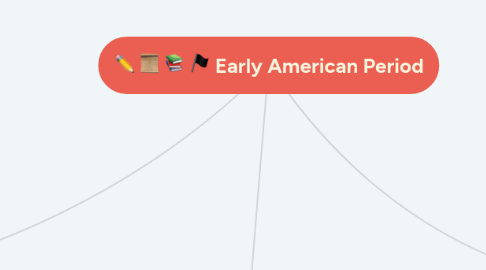
1. Colonialism
1.1. occurred
1.1.1. In 1492 in the course of the conquest, when Christopher Columbus reaches the first discovered lands
1.1.1.1. before the arrival of the Spaniards the American peoples had produced a varied literature.
1.1.1.1.1. but with the arrival of the Spaniards
1.2. Literature of the time describes
1.2.1. America in bright colors like the land of wealth and opportunities.
1.3. The literature were composed of
1.3.1. daily
1.3.2. letters
1.3.3. travel diaries
1.3.4. navigation logs
1.3.5. browser reports
1.4. The Puritans appeared
1.4.1. who held that God was the highest authority on any issue of the human being
1.4.1.1. With the Puritans the bible literature was introduced
1.4.2. The first Puritan colonists who settled New England exemplified the seriousness of Reformation Christianity.
1.4.2.1. Known as the “Pilgrims”
1.5. characters related to literature became known as
1.5.1. William Bradford (1590-1657)
1.5.2. Anne Bradstreet (c. 1612-1672)
1.5.3. Edward Taylor (c. 1644-1729)
1.5.4. Michael Wigglesworth (1631-1705)
1.5.5. Samuel Sewall (1652-1730)
1.5.6. Mary Rowlandson (c. 1635-c.1678)
1.5.7. Cotton Mather (1663-1728)
1.5.8. Roger Williams (c. 1603-1683)
2. Native Americans
2.1. American literature began with
2.1.1. The orally transmitted myths, legends, tales, and lyrics (always songs) of Indian Cultures
2.2. which tell stories about
2.2.1. Life stories
2.2.2. Field work
2.2.3. Religious beliefs
2.2.4. Gods of nature Animals, plants and sacred people
2.2.5. Stories about culture heroes such as the Ojibwa tribe’s Manabozho or the Navajo tribe’s Coyote
2.3. examples of all oral genres can be found in
2.3.1. Lyrics
2.3.2. Songs
2.3.2.1. lullabies
2.3.2.2. of war
2.3.2.3. love
2.3.2.4. for children's game
2.3.3. Myths
2.3.4. Humorous anecdotes
2.3.5. Incantations
2.3.6. Riddles
2.3.7. Proverbs
2.3.8. Epics Legendary histories
2.3.9. Fairy tales
2.3.10. Poems
2.4. some Indian words contributed to American English were
2.4.1. “canoe”
2.4.2. “tobacco”
2.4.3. “potato”
2.4.4. “moccasin”
2.4.5. “moose”
2.4.6. “persimmon”
2.4.7. “raccoon”
2.4.8. “tomahawk”
2.4.9. “totem”
3. The Enlightenment
3.1. was
3.1.1. A philosophical movement that began the early 1700s and ended in the 1810s
3.2. During this period
3.2.1. The American colonies underwent a change in thought.
3.2.1.1. Society began to reject many of the Puritan ideals
3.2.2. literature is known for a variety of genres
3.2.2.1. as
3.2.2.1.1. speeches to pamphlets
3.2.2.1.2. poetry and essays
3.3. some characteristics are
3.3.1. Literature is understood as an end for man
3.3.2. Classic traditional literature is valued
3.3.3. It is realistic and natural
3.4. Enlightenment thinkers believed that
3.4.1. The advances of science and industry meant egalitarianism and progress for humanity.
